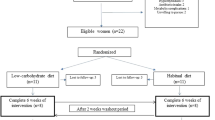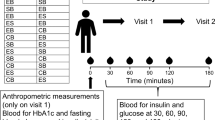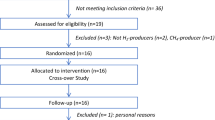Abstract
Objective: To investigate the effect of a breakfast cereal containing inulin on blood lipids and colonic ecosystem in normolipidemic young men.
Setting: Department of Food Science and Microbiology,University of Milan, Italy.
Subjects: Twelve healthy male volunteers, age 23.3±0.5 y, body mass index (BMI) 25.7±1.2 kg/m2 (mean±s.e.m.).
Interventions: Subjects consumed daily, for three periods of four weeks, 50 g of a rice-based ready-to-eat cereal (placebo) and the same cereal containing 18% inulin (test) in substitution of their habitual breakfast, then returned to the habitual diet (wash-out). They followed no other dietary restrictions.
Results: No changes in body weight, dietary habits, faecal and bile acid output, faecal short-chain fatty acid (SCFA) and faecal pH, were observed at the end of each period, whereas plasma total cholesterol and triacylglycerols significantly decreased at the end of test period by 7.9±5.4 (P<0.05) and 21.2±7.8% (P<0.005) respectively. Meal glucose tolerance test (MTT) resulted in the same incremental area under the curve for both cereals (IAUC test 124±35; placebo 118±33 mmol·min/l, ns). Inulin markedly enhanced breath H2 excretion (IAUC test 280±40; placebo 78±26 ppm·h, P<0.005), as well as faecal concentration of L-lactate. Total facultative anaerobes significantly decreased after test, and bifidobacteria increased after correction for total anaerobes (P<0.05). Changes in blood lipids were negatively correlated with bifidobacteria counts and positively with secondary bile acid excretion (P<0.05).
Conclusions: Inulin seems to have a lipid lowering potential in normolipidemic men possibly mediated by mechanisms related to colonic fermentation.
Sponsorship: National Research Council of Italy, grant number 95.00773.PF41.
This is a preview of subscription content, access via your institution
Access options
Subscribe to this journal
Receive 12 print issues and online access
$259.00 per year
only $21.58 per issue
Buy this article
- Purchase on Springer Link
- Instant access to full article PDF
Prices may be subject to local taxes which are calculated during checkout
Similar content being viewed by others
Author information
Authors and Affiliations
Contributions
Guarantors: Furio Brighenti and Enrica Canzi.
Corresponding author
Rights and permissions
About this article
Cite this article
Brighenti, F., Casiraghi, M., Canzi, E. et al. Effect of consumption of a ready-to-eat breakfast cereal containing inulin on the intestinal milieu and blood lipids in healthy male volunteers. Eur J Clin Nutr 53, 726–733 (1999). https://doi.org/10.1038/sj.ejcn.1600841
Received:
Revised:
Accepted:
Published:
Issue Date:
DOI: https://doi.org/10.1038/sj.ejcn.1600841
Keywords
This article is cited by
-
Genome-wide association mapping of arabinoxylan and resistant starch concentration in common wheat (Triticum aestivum L.)
Cereal Research Communications (2023)
-
The interaction between the gut microbiota and dietary carbohydrates in nonalcoholic fatty liver disease
Experimental & Molecular Medicine (2021)
-
The effect of resistant dextrin as a prebiotic on metabolic parameters and androgen level in women with polycystic ovarian syndrome: a randomized, triple-blind, controlled, clinical trial
European Journal of Nutrition (2019)
-
The prebiotic inulin modulates gut microbiota but does not ameliorate atherosclerosis in hypercholesterolemic APOE*3-Leiden.CETP mice
Scientific Reports (2018)
-
Gut microbiota as a potential target of metabolic syndrome: the role of probiotics and prebiotics
Cell & Bioscience (2017)



